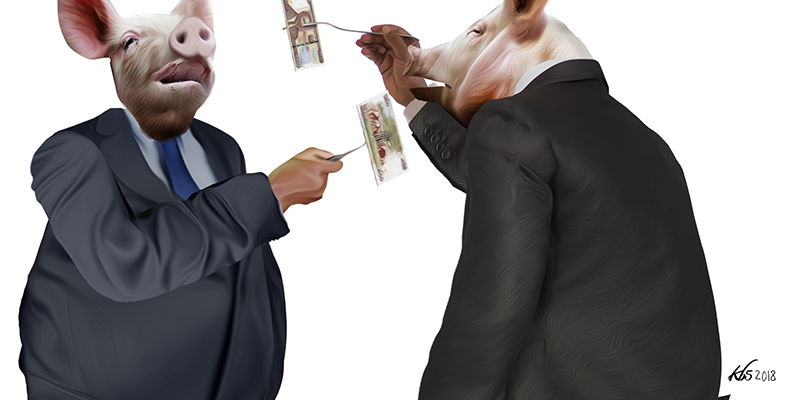Championing a high moral compass in politics and economics
Populism and extremism thrive on fear and hopelessness
Politics and economics must become vehicles of hope and connect with peoples’ aspirations and dreams. Carpe diem!
Photo credit:Clinical Leader
Given what is happening to us all and to the entire web of life, it is tragic to note that the most overlooked leadership skill in politics, economics and business, in teaching and practice, is the absence of a moral compass in decision making. According to the Balance Careers, four of the 10 top leadership skills are: 1) communication, 2) motivation, 3) delegating, and 4) positivity. Wow! Where is the moral compass!!
Is this how to build a better world when there are no virtues except the love for Money, Money, Money!

Photo credit: Via the Elephant
Politics is often described as the art of the possible, but it is also the art of serving the people, by focusing on taking action in the interest of the common good. In a world where trust in political leaders is eroding on a daily basis, when fakery is at the heart of all politicians do, the need for good governance in politics has never been more urgent and important.
The undeniable collapse of integrity, honesty, trust, kindness and decency- by and large- in our public and private life has fueled racial hatred, intolerance, anger, confusion, anxiety and contempt. In the face of this global pandemic of crisis after crisis, where is our leaders’ moral and spiritual compass? Even a cursory look at trends in human behavior will instantly reveal that kindness, compassion, sympathy, empathy and good are on the decline all over the world, while greed, selfishness, narcissism, corruption, and cruelty are on the rise. This, therefore, brings us to the following pertinent questions: What in the world has happened to the moral and spiritual compass? Where has the Common Good gone?
The Time is Now to Speak Truth to Power
To my mind, economic growth should translate into happiness, well-being and increased prosperity for all, securing the safety and survival of the entire web of life.

Photo credit via The Centre for the Understanding of Sustainable Prosperity (CUSP)
Want more productivity and more economic growth Rachel Reeves? I have a very good idea for you
Reimaging how to rebuild a broken growth model: Anchoring Economic Growth in the Pursuit of Human Flourishing First and Foremost
Beyond number crunching and GDP measurements : Rethink and reimagine true economic progress, happiness and well-Being
Nota bene
I have a dream and a big hope that one day our politicians will open up to us, by championing honesty,trust and trustworthiness and projecting what it means to be human. Perhaps alongside the spreadsheets and number crunching, they can also show humility and humanity, fostering a healthy, hopeful, and empathetic society.
I dream that they become a true and honest instrument of positive change, by giving thanks, spreading joy, sharing love, seeing miracles, discovering goodness, embracing kindness, practicing patience, teaching moderation, encouraging laughter, celebrating diversity, appreciating beauty, showing compassion, turning from hatred, practicing forgiveness, peacefully resolving conflicts, communicating non-violently, choosing happiness and enjoying life, and putting all these into practice in all their policies and plans, positively affecting, repairing, and influencing voters’ life satisfaction, expectation, hope and happiness.
Happier workers are the key that unlocks the door to more economic growth
Photo via The Media Online
‘Happiness, happiness, the greatest gift that I posses
I thank the Lord that I've been blessed
With more than my share of happiness
To me this old world is a wonderful place
I'm just about the luckiest human in the whole human race
I've got no silver and I've got no gold
But I've got happiness in my soul…’- "The King of Happiness" and "The Squire of Knotty Ash"
The Madness of Perpetual Economic Growth
Photo credit via Lowimpact.org
Happiness and Productivity
Lest we forget, a miserable, unhappy, depressed, stressed and anxious workforce can not and will not deliver productivity and economic growth. Ignore this at your own peril!
It is now a well established fact that, by and large, happier people, leading a better and more secure life, are much more trustworthy, far less prone to corruption and wrongdoings, much more innovative and creative, much more interested in environmental protection and sustainability, more optimistic and hopeful, more eager to engage in economic activity and production, and thus, much better wealth creators, and thus, encouraging a more sustainable path to a ‘real’ economic growth.
UK workers rank among the world’s most miserable, survey finds
British workers among saddest, loneliest and most disengaged in Europe, report finds
Miserable Britain; are long working hours the cause?
Be Wise and Be Honest
If you want economic growth and prosperity for all, then, first and foremost, pursue happiness and wellbeing for all
Beyond GDP: A Unique Opportunity to Address Well-being, Happiness, Contentment of all the stakeholders working to build a better
The Vision of a Well-Being Economy
‘We must shift how we understand and build societal health and prosperity, looking beyond economic growth to collective well-being and environmental sustainability.’
(Illustration by Helena Pallarés) Via Stanford Social Innovation Review (SSIR)
‘To solve the social, economic, and environmental challenges we face today, we need to rethink the status quo. Governments and other institutions around the world need to embrace new ways of thinking and actively engage in widespread systems innovation to make real progress toward a healthier, more prosperous world. Yet most continue to frame their work within traditional economic models, without recognizing the damage it is causing to society and the planet. This framing often manifests in downstream measures, such as treating respiratory diseases exacerbated by air pollution, rather than investing in public transportation; rebuilding after floods caused by climate change, rather than divesting from fossil fuel and investing in clean energy; or focusing on health interventions related to poor diet, rather than improving agricultural supply chains and encouraging consumer demand for healthy food. While efforts to mitigate the effects of larger problems are vitally important, they do not attend to their root causes and interconnectedness.
‘Instead, we need an economic system that takes a preventative approach to social and environmental challenges to ensure that the kinds of related, follow-on problems mentioned above do not occur in the first place or are far less severe. Thankfully, the wheels are already starting to turn. Some countries are expanding how they measure economic success in a way that includes well-being and sustainability. They are working together to envision and implement a new economic model called the "well-being economy.” The well-being economy encompasses a diverse array of ideas and actions aimed at advancing social well-being through governance structures that support peaceful co-existence and meet basic human needs. A well-being economy provides people with equal opportunities for advancement, a sense of social inclusion, and stability—all of which contribute to human resilience—and, importantly, sustains and supports harmony with the natural world. It aims to serve people and communities first and foremost, and offers a promising path toward greater social well-being and environmental health…’- Continue to read
See also: The Benefits of Happy Workplaces in the Public Sector
From our archive:
Economic Growth: The Index of Misery
Voters are not fooled by Labour’s discredited economic growth gimmicks
Economics as Enabler and Economists as Empowerers of the Good Life and the Good Society
The Fallacy of Economic Growth: In Praise of Robert F. Kennedy
These are what I have learned from 45 years of teaching economics
Fat Cats: An invitation to dialogue
What might an Economy for the Common Good look like?
Compassion, kindness, hope, courage and joy: The Path to a More Loving World
Happiness intersecting with economy
‘The Economics of Happiness: The essence of balancing economic growth with overall well-being
and happiness.’-Photo credit: Topics For Seminar
‘Various articles have connected happiness and economic growth. One such article argues that true happiness and sustainable development rely on strong human connections, trust, and emotional well-being. Drawing from global studies and the World Happiness Report, it highlights rising loneliness and its negative impact on mental and physical health. It notes that Scandinavian countries like Finland lead in happiness rankings by prioritizing social bonds, work-life balance, and inclusive policies. The article cites research showing that happiness boosts productivity, with happy workers being 13% more productive due to better cognitive function. Finland embodies this, where a low-stress lifestyle and strong work-life balance foster both innovation and high happiness levels…’- Continue to read
'Mark Price says solving worker misery will get people back into the labour market and spur the growth the government seeks.'
'Is being happy at work the key to the UK government’s goal of boosting productivity and economic growth? The former Waitrose boss turned big company adviser Mark Price certainly thinks so.'

Lord Price. Photo via The Guardian
In a recent article, ‘People have a right to be happy’, Lord Price , founder of WorkL and former managing director of Waitrose, asks:
‘Is being happy at work the key to the UK government’s goal of boosting productivity and economic growth?’
He then notes that, ‘“If people are happy in their jobs they don’t leave, you retain knowledge, you have lower levels of sick absence, all of which leads to more profitable and more effective organisations. And it’s good for individuals,’
He has the data to back this up, thanks to the 1.5 million workers globally, half of whom are in the UK, who have completed the How Happy Are You at Work? survey run by Price’s organisation WorkL.
Britons are, on average, the unhappiest workers in the G20 group of nations, a fact he believes has a direct link with the economy’s productivity problem, where the UK also has the unhappy position as bottom of the G20.
One of the aims of the Labour government is to get more people back to work – which has been a pervasive problem in Britain since the pandemic, far more than in its European neighbours – and which ministers believe is the best way of cutting the benefits bill.
“All our research shows that if you are happy in your job, you work harder, you’re more productive, you’ll give extra discretionary effort, you’re more likely to be paid more highly than your unhappy colleagues, you’re more likely to be promoted, your mental health will be better and your wellbeing in general will be better.”
Price is calling for a contract between all kinds of employees and their employers, a “work happiness charter”
Price believes that people have a “right to be happy at work”, along with other rights including fair pay, to be equipped with the tools to carry out the job, but also to be “well informed”, “treated with respect” and “given the opportunity to show your ability”.
In return, he says employees have responsibilities and should commit to give their best effort, to be punctual and positive, take responsibility and keep the best interests of their organisation in mind.
Price traces his interest in workplace happiness back to his 34 years at the John Lewis Partnership, the owner of John Lewis department stores and the Waitrose supermarket chain, where he rose from graduate trainee to deputy chair.
John Spedan Lewis established the co-owned business in 1929, when he decided to transfer all the shares in the family business he had inherited into a trust.
Price says he was told on his very first day that, rather than commercial considerations, the partnership’s “supreme purpose … was the happiness of its workers”...-Continue to read
From our archive:
John Lewis Partnership
Portrait of a Great Success: The John Lewis Partnership
Faith, Commitment and Caring Capitalism: The Foundations of John Lewis Partnership
Is a responsible, profitable, sustainable, capitalism possible?
John Lewis’s Partnership 1864-2014: A 150 Years Partnership for the Common Good
Progress on measuring progress
Photo credit:Cambridge Insight
Happiness – or wellbeing, or life satisfaction – has, unfortunately, for a very long time, been a kind of forgotten topic by the academic economists, wrongly, as we now know, believing that Happiness is a soft, wishy-washy topic and a slippery concept to measure, but now, more and more values-led economists are studying and tracking how the public are feeling about their lives and on how more happiness can contribute to more economic progress and prosperity.
From our archive:
Economic Growth: The Index of Misery
Economics and What it Means to Be Human
Why Happiness Should be Taught at Our Universities
Adam Smith and the Pursuit of Happiness
Happy Teachers, Happy Pupils, Happy Schools, Better Education, Better Lives, Better World
Small is Beautiful: The Wisdom of E.F. Schumacher
My Economics and Business Educators’ Oath: My Promise to My Students
A Businessman and an Economist in Dialogue for the Common Good: Dubai 2004
My Economics and Business Educators’ Oath: My Promise to My Students

